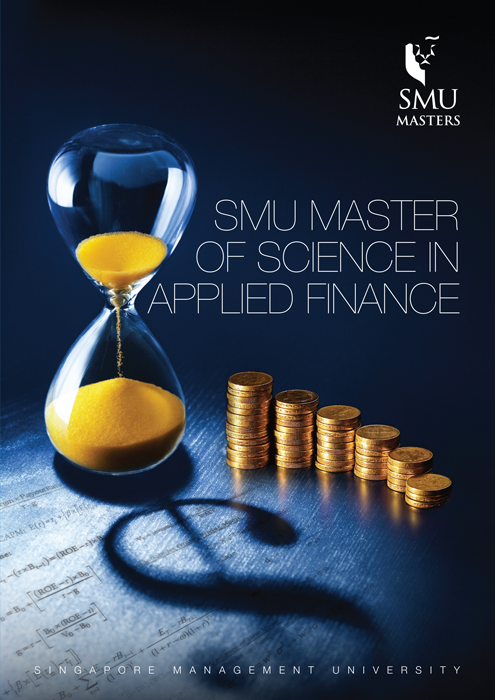
Kathy Zhou stood out from her peers when she joined the analyst training programme at an investment bank in Singapore in 2016. Most of the new recruits in her cohort had just completed their undergraduate degrees, while she had already accumulated more than two years of working experience in another sector.
Zhou, who has a bachelor’s degree in communication studies and business, had been working at a large consultancy firm, advising clients in the information and communication technology field. While she enjoyed the role, she eventually decided to move her career in a new direction: finance.
“I had a lot of friends working in financial services and knew that in Singapore it could offer exciting long-term prospects,” says Zhou. “But I also knew that it would be challenging to change careers, especially into an area as competitive as finance, so I had to find the right qualification to achieve my goal.”
After extensive research, her choice soon became obvious: the MSc in Applied Finance (MAF) from Singapore Management University (SMU). “I already had business skills from university and my job, so I didn’t want to do a generalist MBA,” explains Zhou. “What I wanted instead was practical, career-focused finance knowledge – and the MAF fulfilled these needs perfectly. It’s a great choice if you want to make a career change into a banking or finance role.”
The MAF equips students with a strong blend of financial theory and practice, giving them the concepts, analytical tools and perspectives they need to thrive in a rapidly changing financial services environment. “The professors explain the theory and then support it with real-world examples, so you clearly see how what you’re studying is applied in the workplace,” says Zhou.
The 30 faculty members in the MAF programme combine both industry and academic experience. SMU also brings in guest lecturers from the Singapore finance sector to ensure the degree reflects the latest cutting-edge financial trends.
“They’re all high-quality coaches and their different backgrounds mean you get a good variety of viewpoints,” says Zhou. “For me, one of the best things about the MAF is the teaching style, which is interactive rather than one-way. These coaches don’t just stand there and talk. They are always proactive on feedback and encourage lively debates in class. This helped me learn new concepts more quickly and in more detail.”
Case studies relating to the finance sector form an important part of these classroom discussions. “At SMU, you analyse both international and Asian companies, so you learn about the special attributes of the financial industry in different parts of the world,” says Zhou. “My classmates came from diverse backgrounds with varied experience levels. Some were already working in finance, so I was able to pick their brains and learn from them.”
SMU, which is conveniently located in Singapore’s central business district, offers the MAF over 12 months full-time or over 18 months part-time. The curriculum provides students with an in-depth understanding of economic analysis, financial statement analysis, security pricing, regulatory frameworks, and the dynamics of financial markets, all of which are vital to build a career in today’s financial industry.
The MAF contains 14 core modules, including Advanced Equity Analysis, Advanced Derivatives Analysis, Advanced Fixed-Income Analysis, Advanced Portfolio Management, Corporate Finance, Financial Modelling, and Financial Statement Analysis. Students also complete four elective courses, choosing from specialist options such as Investment Advisory Service and Wealth Management, PE and VC investing, Fintech Essentials, Hedge Fund Management, and Structured Products. The curriculum is designed to suit the Chartered Financial Analyst examination requirements. This complements students who may choose to pursue their CFA designation concurrently.
“Because I didn’t have prior finance background, the MAF equipped me with the analytical and problem-solving skills I needed for a role at an investment bank,” says Zhou. “And having this practical technical grounding in the principles and practices of finance now makes me more confident on the job.”
Alongside their technical modules, MAF students also attend professional development workshops (designed to mimic real-world business scenarios) to improve their soft skills. “My interpersonal skills improved after the programme,” says Zhou. “Being able to communicate well, with both clients and colleagues is actually very important to career success in banking.”
Zhou applied for her investment banking traineeship while still at SMU and started soon after she graduated. She was able to put her newly acquired hard and soft skills to practical use straight away. “Switching careers is always difficult, especially in the first few months, but the MAF programme has taught me how to cope with change and embrace new concepts. I’m now building on what I learned at SMU, in everything from financial modelling to using Bloomberg Terminals.”
She has now been working in investment banking for two years. “Not only do I get detailed understanding of how deals are structured, I’m also involved in larger projects, which have a greater impact on society, than when I was in consulting,” says Zhou. “I find this role stimulating and fulfilling. My MAF degree from SMU helped make this all possible.”
This article was originally published on eFinancialCareers.
Speak to our Admissions Advisors
Lee Kong Chian School of Business
Postgraduate Admissions
Singapore Management University
Lee Kong Chian School of Business
Graduate Programmes Office, Level 4
50 Stamford Road, Singapore 178899
Tel: +65 6828 0882
Join us at the upcoming events
Singapore Management University
50 Stamford Road Singapore 178899
Singapore
Hyatt Regency Tokyo
2-7-2 Nishi-Shinjuku, Shinjuku-ku, Tokyo, 160-0023, Japan
Fairmont Makati
1 Raffles Drive, Makati Avenue, Makati City 1224, Philippines
